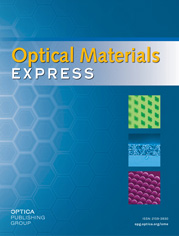Optics Material Express Feature Issue
Polaritonics
Submission Open: 1 April 2023
Submission Deadline: 1 June 2023
Polaritonics encompasses photonics, chemistry, quantum information, quantum materials and device engineering. It is a highly multidisciplinary field with versatile applications and a promising future. This feature issue will highlight recent advances and future perspectives in the field of polaritons and the strong-coupling regime between light and matter, covering photonics, materials science, quantum technology and computing. We welcome contributions on different polaritonic systems in the solid state (i.e. exciton-polaritons, phonon-polaritons and plasmon-polaritons), as well as on topics that cut across several materials, from well-established III-V semiconductors to novel two-dimensional materials and beyond. Submissions that report on new fundamental phenomena, device applications, experimental characterization, and theoretical modelling are also welcome.
Topics to be covered include but are not limited to:
- Phonon polaritons, exciton polaritons, magnon polaritons and plasmon polaritons
- Optomechanics in polaritons
- Quantum polaritonics
- Polariton valleytronics, pseudo-spin and spin switching
- Topological effects
- Very-strong and ultra-strong coupling
- Polaritons in 2D materials and twisted heterostructures
- Polaritons in perovskites and emerging materials
- Material systems for polariton condensates and lasing
- Polariton simulators and polariton-based neurophorphic computing
- Polariton chemistry
Manuscripts must be prepared according to the usual guidelines for submission to Optical Materials Express and must be submitted online through the Prism submission system. When submitting, authors should specify that the manuscript is for the "Polaritonics" feature issue (choose from the drop-down menu).
Feature Issue Guest Editors:
Gabriele Grosso, City University of New York, USA (Lead Editor)
Carlos Antón-Solanas, Universidad Autónoma de Madrid, Spain
Dario Ballarini, Italian National Research Council (CNR), Italy
Alejandro Fainstein, Centro Atómico Bariloche and Instituto Balseiro, Argentina
Barbara Pietka, University of Warsaw, Poland

